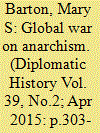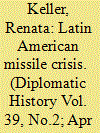|
|
|
Sort Order |
|
|
|
Items / Page
|
|
|
|
|
|
|
| Srl | Item |
| 1 |
ID:
143860


|
|
|
|
|
| Summary/Abstract |
Two decades before the assassination of Austrian Archduke Franz Ferdinand in June 1914 sparked the First World War, a wave of anarchist terrorism had taken the lives of seven heads of state in Russia, Europe, and the United States, and caused hundreds of civilian causalities. In response to these attacks, continental European governments called for collective action against the common danger. Despite European overtures for American involvement in an anti-anarchist league, particularly after President William McKinley’s assassination by a self-proclaimed anarchist in 1901, U.S. policy makers rejected collective, multilateral action with European governments in favor of a unilateral, nationalized response through exclusionary immigration legislation. The Immigration Act of 1903, America’s first encounter with modern terrorism set significant legal precedent, orienting the United States away from international cooperation and toward domestic policies of exclusion and deportation.
|
|
|
|
|
|
|
|
|
|
|
|
|
|
|
|
| 2 |
ID:
143850


|
|
|
|
|
| Summary/Abstract |
This article argues that as the United States attempted to salvage its image as a benevolent nation in the wake of the Vietnam War, a movement of Vietnamese refugees demanding repatriation challenged the notion that the evacuation of Vietnamese was a necessary rescue operation motivated by humanitarian concern. Via wire reports and communiqués, the Vietnamese government accused the United States of fabricating a humanitarian emergency in order to continue meddling in Vietnam’s affairs. In the broader picture of U.S. foreign relations, the repatriate issue threatened to undermine America’s efforts to rehabilitate its image of itself as a benevolent power at a time when the United States had lost credibility due to misguided policy decisions, atrocities committed by American troops during the Vietnam War, and the postwar embargo. Images of Americans embracing Vietnamese refugees served as a form of damage control as the United States sought to reclaim its moral authority, which had undergirded the benevolent image it had used to justify its intervention in Vietnam in particular and global dominance in general.
|
|
|
|
|
|
|
|
|
|
|
|
|
|
|
|
| 3 |
ID:
143861


|
|
|
|
|
| Summary/Abstract |
Historians have long recognized the significance of Article 14(d) of the Geneva Agreement, which helped precipitate a refugee exodus from northern Vietnam. The origins of the clause itself remain obscure, however. This study argues that the administration of Dwight D. Eisenhower played a critical role in pushing for the clause's inclusion in the Geneva settlement. Thwarted in its efforts to save the French in Indochina by military intervention, and forced to acquiesce in the conceding of territory to Ho Chi Minh, the administration's support for the article was an exercise in diplomatic and domestic damage limitation. In addition, the clause formed part of the administration's post-Geneva strategy aimed at bolstering Ngo Dinh Diem and the rump southern polity left in the wake of Vietnam's partition.
|
|
|
|
|
|
|
|
|
|
|
|
|
|
|
|
| 4 |
ID:
143849


|
|
|
|
|
| Summary/Abstract |
This is a transnational history of the ways that the Cuban Missile Crisis affected national politics and international relations in the Americas. It argues that Latin American governments and citizens tried to take advantage of the crisis to change both local balances of power and relations with the United States.
|
|
|
|
|
|
|
|
|
|
|
|
|
|
|
|
| 5 |
ID:
143851


|
|
|
|
|
| Summary/Abstract |
During 1935, a transnational social movement coalesced to protest the Italian Fascist régime’s escalating threats to invade Ethiopia. Although the global antiwar movement failed to prevent war, it did, day by day through diffuse acts, transform the dynamics of global politics. Using a repertoire of informal political practices, including mass meetings, street fights, riots, and strikes, the movement enabled common people to directly assert themselves on a question of international affairs. This article makes the case for recognizing the Hands Off Ethiopia campaign as a critical turning point in the making of a twentieth-century global left, with effects on international history that continued into World War II and lasted through the postwar era of decolonization. Conceptually, “Local People’s Global Politics” recommends that transnational history attend to the flow of ideas and power between spatial scopes such as the local and the global.
|
|
|
|
|
|
|
|
|
|
|
|
|
|
|
|
| 6 |
ID:
143859


|
|
|
|
|
| Summary/Abstract |
Our ignorance, combined with our power, make the position of America in the world very perilous … . We can only hope that we will have enough years of grace to learn wisdom as only experience can teach it.
|
|
|
|
|
|
|
|
|
|
|
|
|
|
|
|
|
|
|
|
|